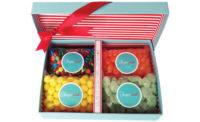Here Come the FEDS
By Dan Malovany
Federal Bakers USA’s new 70,000-sq.-ft. plant provides much-needed capacity and the opportunity to better serve its customers, expand into new markets and diversify with new lines of innovative, premium products.
Some folks never can decide what they want to be when they grow up. Then there are those precocious people who seem destined from birth to be pediatricians, politicians or police officers as adults.
But perhaps the luckiest of those are the select few who believe they can do everything and have the potential to do it all.
Federal Bakers USA is experiencing the same growing pains that many college students go through during that crucial period in their lives, but this company is one of the lucky few. That’s because a world of opportunity literally is staring the 20-year-old bakery in its face. Its three plants in suburban Chicago, Philadelphia and Washington, D.C., supply their regional markets with premium products made fresh daily. At the same time, this wholesale baking operation produces frozen breads, sweet goods, desserts and breakfast items to national accounts and even customers as far away as Asia. The channels it serves range from foodservice chains and in-store bakeries to contract manufacturing, and the demand for its premium products continues to build.
For Kambiz Zarrabi and Mansour Yazdani, directors of this burgeoning wholesale baking company, the challenge is how to take full advantage of the business that lies before them. And they realize that growing up can be hard to do.
“We eventually got to the point where we were too big to be a small bakery and too small to be a big bakery,” Zarrabi explains. “The supply and demand was there for us to grow in the market, and we knew we had to move into a large facility, and that’s what we are doing now.”
In Sterling, Va., just a $10 cab ride from Dulles Airport near the nation’s capital, Federal Bakers USA in May opened a 70,000-sq.-ft. plant that eventually will house its headquarters, six production lines and 12,000-sq.-ft. of freezer space to hold up to 600 pallets of frozen baked goods.
Currently, the bakery is starting up its state-of-the art bread line, which is versatile enough to produce everything from 1-oz. dinner rolls and 3-oz. sandwich buns to full-size baguettes, ciabatta, focaccia, sourdough and an array of boules, artisan and specialty breads.
At the same time, the plant is ramping up production of a newly minted croissant makeup line that’s capable of producing up to 20,000 pieces an hour, although the line realistically will run at half that speed because the rich dough contains anywhere from 30% to 32% butter.
“The equipment that we bought is very versatile,” Zarrabi says. “If a customer wants a lower priced croissant, our new line can produce them. On the same line at a lower speed, we can produce a very high-quality product.”
From its existing Arlington, Va., bakery, Federal Bakers USA is moving its muffin, Danish and scone operations, as well as its semi-automated, high-end frozen desserts, to the new facility. The company creates about 400 cheesecakes, chocolate mousse, cappuccino cakes and assorted treats daily.
Toward the end of this year, the plant also will house a new automated, laminated line that will make up its top-selling Danish and other pastries and a separately enclosed U.S. Department of Agriculture-inspected plant to create sandwiches, handheld snacking entrees and possibly small, upscale pizzas.
In all, the expansion is expected to top $15 million. That’s quite an investment for a company with annual sales in the $25-$40 million range, but it’s necessary to take advantage of the opportunities that lie before them.
“Our main target market is the upper gourmet line of products made with high-quality ingredients and also wholesome baked goods made with whole grains, Omega-3s and multi-vitamins that are all trans fat-free,” Zarrabi adds.
Federal Courts Customers
Federal Bakers USA’s diversified sales strategy has resulted in significant growth, which has made its most recent expansion a priority.
“Over the last 20 years, we have had the goal of growing 10% to 12% annually, and we have achieved 15% growth every year,” Zarrabi says.
Initially, Yazdani notes, the business blossomed by supplying baked goods to airline food distributors in the Washington, D.C., area. Shortly afterward, Federal Bakers USA expanded its service to international airlines and the large number of commissaries serving U.S. government agencies in the region. From there, the bakery began producing items for foodservice chains, foodservice distributors and catering operations.
As a result, the 1,500-sq.-ft. wholesale bakery and retail shop moved to a 5,000-sq.-ft. facility, which grew to 7,000, 10,000 and 12,000 sq. ft. over time. It’s a move all-to-many cautious companies make: enlarging operations at the same pace as the business grows. Looking back, Zarrabi might have done it differently since Federal Bakers’ growth eventually exceeded its ability to expand.
“We should have just moved to a much bigger facility from the beginning,” he says. “I guess you learn your lessons through experience because the bakery became obsolete because of our growth. We acquired other customers and co-packing became a larger part of our business.”
Today, its list of clientele ranges from hotels and fine-dining restaurants to cruise liners, in-store supermarket bakeries and contract manufacturing for other food companies.
“We are very customer-oriented,” Yazdani says. “We’re willing to make products to their specifications. We have a large R&D department, which is very good at helping us make products that our customers want.”
In all, Federal Bakers’ portfolio is made up of 250 different products. For instance, it supplies frozen dough, par-baked products and fully baked frozen bread and rolls. Moreover, it has seen frozen croissant sales blossom, partly because it uses pure butter, but also because it produces a smaller varieties. Portion control, Zarrabi says, pays off big time, especially when producing sweet goods such as cinnamon rolls.
“One of our biggest sellers is Danish because we took the trans fat out of the product,” he explains. “None of our products have more than 500 calories and 18 g. of total fat.”
Although Midwest consumers prefer larger portions, he adds, Americans along the East and West coasts trend toward lighter, smaller and better-for-you products.
“Everyone seems to be going more toward healthier products,” Zarrabi says. “That’s making our job more exciting because you have to rely more on your R&D lab to help you product those products and make sure they taste good.”
Among its core products are scones and muffins, with blueberry being the company’s signature flavor in these categories.
“Scones are the best seller in Washington because it is more of a gourmet city with a wide variety of different types of restaurants, whereas in Chicago, the muffin is the biggest seller in that market,” Yazdani says.
New Plant Goes Online
Production at Federal Bakers USA combines baking fresh daily to meet local orders with longer runs to build and replace frozen inventory for national accounts. Scones and muffins that primarily are baked at its Chicago-area plant are exchanged with bread, frozen dough and other products that make up the bulk of the Washington, D.C., area’s operation.
The new Sterling, Va., plant currently houses a 1,000-lb. horizontal mixer that produces batter for cakes, muffins and scones and two other mixers for creating sponge and dough. About 70% of Federal Bakers’ bread products are made using the sponge-and-dough process. Bakers initially create the sour, which retards for 24 hours prior to making the sponge, which ferments for another 24 hours. The two-day process, Zarrabi notes, creates aromatic, premium breads with a full-bodied flavor.
Production on the new bread line begins with the troughs being automatically elevated to a 750-lb. hopper. After dividing the dough, the chunks flow through a sheeter with a series of five variable-sized rollers that gently form a 600-mm. wide sheet with little or no stress. Following a light flour dusting, the dough sheet passes through a reduction station with a large roller that flattens it, followed by a wheel of eight-rollers that pat down the sheet even further like fingers lightly working the dough.
Depending on the product, the sheet will pass through up to five reduction stations and sheeters, some of which are on rollers that allow various systems to be added or removed and increase the line’s versatility. Moreover, its cutting station can be outfitted with everything from a straight guillotine to cutters that produce strings of baguettes, focaccia or ciabatta loaves to others that punch out 24, 1-oz. pieces at a time; 18, 3-oz. rolls simultaneously; or three, 1-lb. boules at once.
Because the bakery produces high-end items such as ciabatta using a viscous 85% water dough, it runs the line at speeds much slower than its capacity. For instance, Zarrabi notes, the systems are designed to produce 20,000 1-oz. rolls an hour, but its run rates are estimated at 15,000 or 16,000 pieces an hour. Likewise, 3-oz. roll production runs at 10,000 pieces an hour, or about 6,000 fewer than capacity.
After passing through the guillotine, the pieces travel through another roller that flattens buns and other products. The makeup line also has a baguette aligner and elongating system that extends the dough pieces. That system also comes with an apparatus that can punch holes in focaccia bread before the pieces pass under a final topper and onto an automatic pan loader and racking system.
Because of the diversity of its products, Federal Bakers USA uses a 36-rack proofbox that allows it to make different items at once. Proof times range from 25 minutes for baguettes to more than 70 minutes for heavy, rustic bread varieties. An automatic loader then places the dough pieces in the versatile 50-ft. hybrid oven with both direct-fired and impingement baking capabilities. Sometimes they use both.
“If we’re baking ciabatta, we may use direct heat to set the crust and impingement to finish off the bake,” Zarrabi says.
An adjacent boiler provides steam to both the proofbox and the oven, which is designed so that it can be expanded to add additional throughput. Depending on the type of bread or rolls, bake times range 10 to 90 minutes. Products requiring less than 30 minutes of cooling travel on a conveyor leading to an ambient spiral cooler. That conveyor also has a de-panner and a paper peeler for removing products baked on parchment paper.
Heavier artisan breads that require up to 90 minutes of baking or cooling are diverted to a separate conveyor and racked and cooled until the products reach their ideal 80ºF internal temperature.
After leaving the spiral cooler, products travel to a spiral freezer set at -40ºF before being case-packed, palletized and placed in the holding freezer. At the entrance of the freezer, a diverting gate also can send products down a conveyor to be packaged at ambient temperature for local fresh delivery.
All Under Control
Overall, the main hall is ambient temperature. In addition to the bread line, the main room will house a muffin and sweet goods line, and up to eight double rack ovens.
However, many of the other parts of the bakery are temperature-controlled. In an adjacent room set at 55ºF, for instance, the bakery is starting up its croissant line, which will make up pieces that are frozen and either baked off at this bakery or by one of Federal Bakers customers. That room also will house the new laminated products line.
Additionally, frozen cake, dessert and pastry production will be conducted in another room set at 60ºF, while the USDA-inspected operation — expected to be up and running within the next six months — will be set at 55ºF.
The facility also has all the bells and whistles that any automated bakery needs.
In addition to a pan washing and sanitation room and a gated-off area for maintenance, the plant is erecting floor-to-ceiling rack system to warehouse all packaging materials, as well as flour and other ingredients. The bakery has a 4,000-sq.-ft. refrigerator for perishable ingredients such as milk, butter and whole eggs.
Eventually, Federal Bakers plans to install flour silos and other bulk ingredient systems to streamline production. Today, most ingredients are stored in either bags or totes until the bakery makes the transition.
All the products leave the facility through two shipping bays. The bakery also has two bays for receiving ingredients and one for trash compacting.
For food safety and plant security, cameras are located throughout the facility to monitor everything that happens both inside and outside the bakery. The bakery also has new headquarters with state-of-the-art information technology systems that will track everything from purchasing and sales to production at all three of its bakeries.
“With the expansion now, we can see a 15% to 20% growth by just getting it all up and running,” Zarrabi says. “We expect the business will increase by 50% over the next three years.”
By then, there will be no doubt that Federal Bakers USA is in the big leagues. After all, as one of the lucky ones, it believes it can do everything … and now has the potential to do it all.
At a Glance
Company: Federal Bakers USA
New Headquarters: Sterling, Va.
Plants: 70,000-sq.-ft. facility in Sterling, Va.; 57,000-sq.-ft. facility in Bloomingdale, Ill.; 20,000-sq.-ft. facility in Paoli, Pa.
Products: Premium bread, roll, muffins, Danish, scones, croissants, load cakes, frozen cookie dough, upscale pastries, cakes and desserts. Fresh products distributed regionally. Frozen items shipped nationally.
No. of Products: 250
No. of Employees: 200
Web site: www.FederalBakers.us
Key Personnel
Director: Kambiz Zarrabi
Director: Mansour Yazdani
Sweet Home Chicago
First it was The American Scone Co. Then it became part of HPR Bakers. Today, Federal Bakers operates the 57,000-sq.-ft. plant in Chicagoland’s Bloomingdale, Ill., where it makes both fresh delivered and frozen scones, muffins, croissants, Danish and loaf cakes, as well as frozen cookie dough.
The company describes the operation as a “hybrid” bakery that can produce 400 cases of scones on an automated line at a rate of 1,000 per hour, or hundreds of muffins a day.
“Because we bake fresh daily, we may be producing several different types of products at a time,” explains Bob Trojanek, purchasing manager. “We’re like a chop shop. We bake to inventory, and we bake to order. We typically stock about two weeks worth of frozen products at a time.”
Because of the number of small runs, the plant doesn’t have any bulk handling systems. Instead, it relies on bagged dry ingredients and totes for liquid ones.
The bakery has three makeup areas. One room produces frozen cookie dough. A second houses a “scone zone” and muffin depositors. Laminated products such as the company’s popular Danish are made up on a third line. The plant has an 8-rack and a 12-rack proof box and 11 single- and double-rack ovens.
Products are packaged on two lines, one for fresh and one for frozen. Frozen products typically are packaged in a clamshell or tray before passing through metal detection, case packing and palletizing. More than 90 people work on two shifts in the bakery.
Because the operation is semi-automated, Trojanek says, Federal Bakers USA can create custom-designed products made to their customers’ specifications. Additionally, he adds, the Bloomingdale plant exchanges product with the Washington, D.C., area facility, which produces a variety of premium breads and specialty desserts.
Making a Federal Case
Federal Bakers initially was the name of a historic bakery in Washington, D.C. When that landmark company went out of business, Kambiz Zarrabi and Mansour Yazdani picked up the brand that so perfectly reflected many of the customers they served.
That included one at 1600 Pennsylvania Avenue.
“From the beginning, we had most of the airline business around the Washington area, but we also began serving government agencies and even the White House dining room,” notes Yazdani, who is Zarrabi’s co-director of Federal Bakers USA. “That was the most prestigious $20 account in the beginning.”
Over the year, Federal Bakers provided products to the nation’s First Family’s headquarters, including items for former President Bill Clinton’s inauguration.
Although the White House is no longer one of Federal Bakers USA’s accounts, such prestige did garner special attention.
“The Secret Service would stop by regularly to check our operation,” Yazdani says.
Of course, that’s not to make a federal case out of nothing. It was just standard operating procedure.



